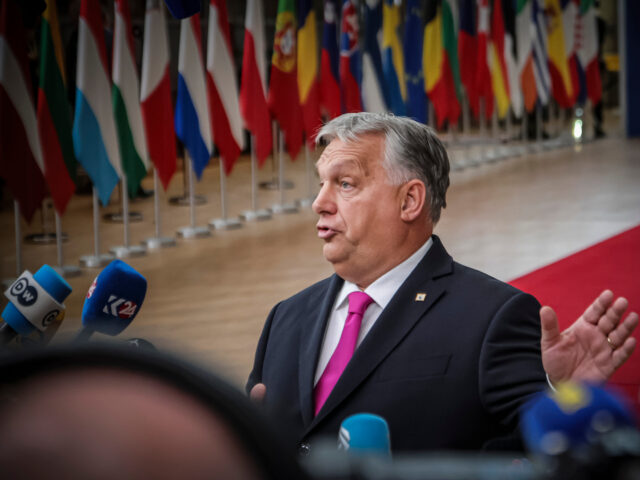Hungarian Prime Minister Viktor Orbán has written a letter to Brussels threatening to use his veto power to block EU funding for Ukraine and the accession process to admit the country into the bloc, demanding a “fundamental debate” about the bloc’s strategy on the war.
With European Union funding for Ukraine set to dry up at the end of the year and expansionist Eurocrats seeking to swiftly incorporate the partially-occupied state into their ranks, Brussels’ grand plans may be derailed by Budapest, with conservative leader Viktor Orbán vowing to not only block further military aid but also Ukraine’s ascension process unless the EU actually grapples with the realities on the ground.
In his letter addressed to European Council President Charles Michel and other national leaders, the Hungarian PM said that continued funding and admitting Ukraine into the EU was based on the premise that the West’s strategy in the proxy war against Russia was successful. However, Orbán, according to German news magazine Der Spiegel, noted that Kyiv’s “Spring” counteroffensive has mostly failed, with the lines of combat remaining static.
Ukraine’s failure to recapture its territory from the Russians should spark a “fundamental debate” about Europe’s strategy going forward, he argued.
In total, the European Union has provided 85 billion euros ($93bn/£74bn) in aid to Ukraine since the invasion nearly 21 months ago. However, funding is only guaranteed until the end of the year, meaning that Orbán’s threat of a veto is likely to cause panic in Brussels. EU Commission President Ursula von der Leyen has called for another round of 50 billion euros in funding. Ukraine would further stand to benefit from €186 Billion should it be accepted into the European Union.
In a speech this week, Orbán warned that the mood of the American public is turning against continued funding of the war in Ukraine and that if Republicans come into power in Washington next year, Europe could be left holding the bag and forced to finance the conflict alone. “Europe is getting poorer, it doesn’t have the money for such a big crisis,” the prime minister noted.
Throughout the war in Ukraine, Prime Minister Orbán has been one of the few leaders in Europe to consistently call for peace negotiations to end the conflict, and has been harshly criticised for the stance.
The Hungarian leader has also queried the notion of accepting Ukraine into the European Union, saying that many questions remain about the practicality of such a move. Principally, Orbán has questioned what it would mean for the EU to absorb a country actively at war.
Although the bloc does not have a common defence pact like the NATO military alliance, it remains to be seen if a future border dispute between Russia and Ukraine would force other European powers to join in the fight against Moscow and potentially trigger a third World War.
A summit has been planned for December 14th and 15th on the topic of Ukraine’s ascension. However, this process can only go forward if all member states agree, with each country having the right to veto proceedings. In addition to holding the power to block Ukraine’s admission into the EU, Orbán also holds a similar veto over Ukraine’s aspirations of joining NATO.
In addition to raising questions about the idea of admitting a country currently at war, the Hungarian leader has also expressed concerns about the rampant corruption in Ukraine, which falls afoul of the EU’s standards for member states. Issues surrounding the alleged violations of the rights of ethnic Hungarians within Ukraine have long been a bone of contention between the two countries as well.
Eurocrats in Brussels have been far more enthusiastic about the prospect of expanding their influence through the admission of Ukraine, with Commission Chief Ursula von der Leyen proclaiming that they are following the “call of history“. Meanwhile, European Parliament President Roberta Metsola has suggested that Ukraine should be given special dispensation to avoid the typically lengthy process and be allowed to enter the union on an accelerated time frame.

COMMENTS
Please let us know if you're having issues with commenting.